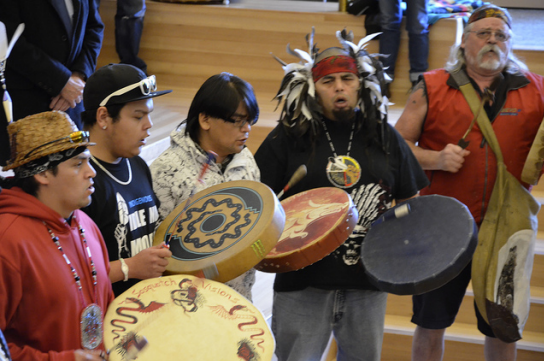Print Edition: February 27, 2013
Idle No More visited campus again this week, exploring questions of legitimacy and citizenship. Who can truly call Canada home?
George Manuel was the founder of the World Council of Indigenous Peoples, long-time president of both the National Indian Brotherhood and the Union of BC Indian Chiefs. He also authored Fourth World: An Indian Reality before passing away in 1989. This past Thursday, he was honoured at an Idle No More event held at UFV.
On the day of George Manuel’s birthday, a teach-in event supported Idle No More’s National Indigenous Rights Educational Day. The day was split into two events. The first was in the afternoon at UFV’s Abbotsford campus, and the second event took place later in the evening at the gathering place on the Chilliwack campus.
The first speaker was Doreen Manuel, daughter of George Manuel. In honour of her father, she had come prepared with a film composed of his daily journals, photographs, slides, CBC footage and interviews. Through this footage, the audience was told how, in 1981, he led a movement from the West to form a lobby against the non-inclusion of aboriginal rights. Touching on the recurrent theme of the Idle No More movement decades before it was founded, the film ended with George Manuel stating that he would like “to see Indian people get the opportunity that justly belongs to them.”
The second speaker was Sakej Ward who guided discussion by examining the Canadian state’s claims to sovereignty.
“How legitimate is Canada’s claim to sovereignty over indigenous people or nations?” he asked those gathered.
He explored the history of what he referred to as the “invasion” of Canada, which began in 1452 with Christopher Columbus.
Hundreds of years later, Ward said, we are faced with a Canada that is 99.75 per cent for Canadians and 0.25 per cent for aboriginal reserves.
“Five pieces of legislation were passed over a short time to ensure the government had power and authority usurped and replaced,” Ward said, describing five acts passed between 1868 and 1884, including the Indian Act.
He compared these acts to what would be equivalent to “removing the election system of Western democracy.”
“I urge you to think that Canada does not have the right to make or enforce any colonial law on Indigenous territory,” he said in conclusion. “The entire system is not legitimate.”
The next speaker was Nicole Shabus, who represents many Native bands as a lawyer in the interior and coastal area. She touched on five issues she says need to be dealt with: BC’s Indian land, the importance of fish, government recognition of Indian rights, Indian governance and government regulation resolving in restriction of Indian fishing rights. She continues to describe that food fishery and commercial fishery is one of the main wedges of colonial rule.
“The distinction of food fishery is tantamount in terms of fisheries to what the reserve system did in terms of land,” Shabus said, calling for change. “Racism has no place in fisheries management.”
She ended her speech by declaring that Canada is in continual violation of Human Rights standards.
The last speaker was Art Manuel, the son of George Manuel. He told tales of his father’s achievements, giving the audience a personal viewpoint of the struggles he faced. He stated that in the days of his father’s time, such a meeting could not have occurred, because at that time it was against the law. He shared the viewpoints of Sakej, saying that we need to change the fundamental problems of settlers and First Nations.
“What reasons do non-natives have to be here in North America?” Manuel concluded. “They have the human right to be here. They’ve been here. We have to recognize that, just like they have to recognize our human rights as indigenous people.”



